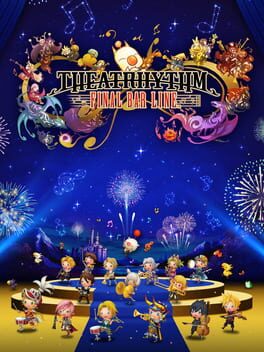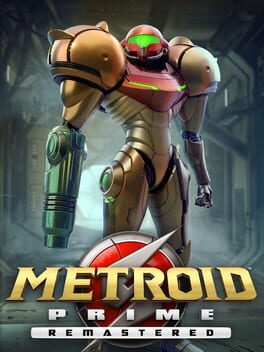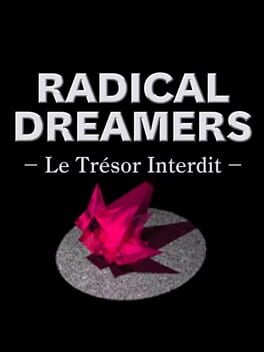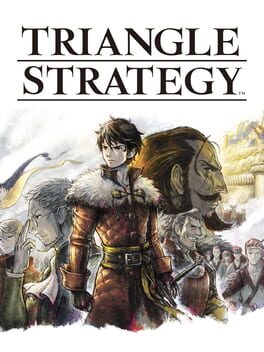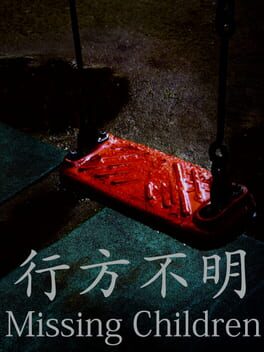planethiko
5 reviews liked by planethiko
Easily my favorite entry in my favorite rhythm game series. While I have some minor criticisms about character availability (basically only the characters from All-Star Carnival made it) and mechanical transparency (detailed below), the complete experience more than makes up for it with a staggering 400+ tracks (as of this writing), entertaining multiplayer, and a very easy quick-play game flow. With that, on to my main gripe:
Although Theatrhythm's signature RPG mechanics do take something of a backseat to the core loop -- you can still clear songs and score points completely independently of a party comp -- nearly every song in the base game has an accompanying quest to complete. They range from simple (clear this song on xyz difficulty) to grueling (complete with a perfect chain), with some even falling back on proper setup of a proper RPG party to clear (i.e. defeating bosses with a weak element, activate x abilities, beat y enemies). For those, there's a surprising lack of transparency about what actually gets you there. Abilities tell you exactly what they do, but stats' effect on beating enemies or travelling through the game's field stages is otherwise ambiguous, and there's no bestiary to cross-reference enemy patterns and weaknesses other than a stage highlight showing you ONLY the boss's weakness. It often results in having to repeat a song, sometimes multiple times, to see how to sequence abilities and even just to hope for the best. Plenty of times I'd full combo songs and fail quests despite having a jacked party, just because I was missing a key ability or two. While it isn't outwardly -frustrating- (i.e. I'm still very much enjoying playing the rhythm game), it did occasionally leave me scratching my head wondering why there wasn't some quick reference for status effects outside of very short load screens, or why the developers couldn't just tell me that Shinra grunts are weak to fire in a side page. THAT BEING SAID...
This and the character/song availability seriously didn't detract from my experience in a debilitating way. Final Bar Line is JAM packed with excellent music from all across the Final Fantasy (and soon to be non-FF Square Enix) series, giving me much-increased appreciation for music from titles like Record Keeper and FFXIII, regardless of my feelings of the games they came from. It runs perfectly clean on the Switch, with friendly load times and a clean 60 FPS for every music stage without really sacrificing too much visually. Multiplayer PVP is a blast with bursts on, and rewards thoughtful party composition, which was a huge surprise for me. Charts are very carefully crafted with clever enemy placement (TFF has always been quite good about the "if-you-know-you-know" enemy layouts appropriate to each music track) and the return of Supreme difficulty from the Arcade-only All-Star Carnival means players are sure to have their work cut out for them if they want to take on every challenge FBL has to offer.
Make no mistake -- this is the full package Theatrhythm game I'd always hoped for, and it has a bright future with planned content for the next few months bringing the likes of Chrono, Mana, SaGa, and other SE mainstays into the fold. Absolutely well worth your time if you're an FF fan or if you simply enjoy an excellent rhythm game with a little extra.
Although Theatrhythm's signature RPG mechanics do take something of a backseat to the core loop -- you can still clear songs and score points completely independently of a party comp -- nearly every song in the base game has an accompanying quest to complete. They range from simple (clear this song on xyz difficulty) to grueling (complete with a perfect chain), with some even falling back on proper setup of a proper RPG party to clear (i.e. defeating bosses with a weak element, activate x abilities, beat y enemies). For those, there's a surprising lack of transparency about what actually gets you there. Abilities tell you exactly what they do, but stats' effect on beating enemies or travelling through the game's field stages is otherwise ambiguous, and there's no bestiary to cross-reference enemy patterns and weaknesses other than a stage highlight showing you ONLY the boss's weakness. It often results in having to repeat a song, sometimes multiple times, to see how to sequence abilities and even just to hope for the best. Plenty of times I'd full combo songs and fail quests despite having a jacked party, just because I was missing a key ability or two. While it isn't outwardly -frustrating- (i.e. I'm still very much enjoying playing the rhythm game), it did occasionally leave me scratching my head wondering why there wasn't some quick reference for status effects outside of very short load screens, or why the developers couldn't just tell me that Shinra grunts are weak to fire in a side page. THAT BEING SAID...
This and the character/song availability seriously didn't detract from my experience in a debilitating way. Final Bar Line is JAM packed with excellent music from all across the Final Fantasy (and soon to be non-FF Square Enix) series, giving me much-increased appreciation for music from titles like Record Keeper and FFXIII, regardless of my feelings of the games they came from. It runs perfectly clean on the Switch, with friendly load times and a clean 60 FPS for every music stage without really sacrificing too much visually. Multiplayer PVP is a blast with bursts on, and rewards thoughtful party composition, which was a huge surprise for me. Charts are very carefully crafted with clever enemy placement (TFF has always been quite good about the "if-you-know-you-know" enemy layouts appropriate to each music track) and the return of Supreme difficulty from the Arcade-only All-Star Carnival means players are sure to have their work cut out for them if they want to take on every challenge FBL has to offer.
Make no mistake -- this is the full package Theatrhythm game I'd always hoped for, and it has a bright future with planned content for the next few months bringing the likes of Chrono, Mana, SaGa, and other SE mainstays into the fold. Absolutely well worth your time if you're an FF fan or if you simply enjoy an excellent rhythm game with a little extra.
For the sake of brevity, I'm happy to skip over what people generally know or can find out about Metroid Prime. It's a 3D first-person action-exploration game where you collect upgrades and battle enemies. Its mechanics are well-explained elsewhere. 2003's Metroid Prime is largely referred to as one of the best games on its original platform, a timeless classic, and if you're feeling especially hyperbolic, one of the greatest games of all time. What sticks out to me is that even in 2023, Metroid Prime is every bit as brilliant and unique as it was 20 years ago...and all it really got was a facelift.
Remastered really doesn't do much to tip the scale any heavier in Prime's favor, but the visual overhaul is certainly impressive. If anything, a repackaging just serves to show how far ahead of its time the original game was; there are very few adventures quite like it, and aside from the follow-up Prime games, I'm hard-pressed to come up with another first-person explor-action example. From near-impeccable level design to a narrative style that almost certainly rivals the piecemeal world building approach of more contemporary games (I'm not gonna say Dark Souls, don't worry), Retro Studios expertise on display shows very few signs of aging.
Of course, opting for a visual overhaul and not, say, a complete remake has its drawbacks. The last 30% or so of the game, the hunt for Chozo artifacts, remains the same -- I think of it as one of the game's lone blemishes -- and the new dual-stick "modern" control scheme doesn't really do a lot to change how the game is balanced around its original control scheme. Still, the game isn't especially difficult and a lot of the experience is defined by enjoying the ambience, so balance concerns are minor at best.
If you're looking for a chance to catch up on a historic game or even just want to relive some glory days, don't be hesitant to pick this up at its $39.99 USD price point. If you didn't like Prime to begin with, this probably won't change your mind.
Remastered really doesn't do much to tip the scale any heavier in Prime's favor, but the visual overhaul is certainly impressive. If anything, a repackaging just serves to show how far ahead of its time the original game was; there are very few adventures quite like it, and aside from the follow-up Prime games, I'm hard-pressed to come up with another first-person explor-action example. From near-impeccable level design to a narrative style that almost certainly rivals the piecemeal world building approach of more contemporary games (I'm not gonna say Dark Souls, don't worry), Retro Studios expertise on display shows very few signs of aging.
Of course, opting for a visual overhaul and not, say, a complete remake has its drawbacks. The last 30% or so of the game, the hunt for Chozo artifacts, remains the same -- I think of it as one of the game's lone blemishes -- and the new dual-stick "modern" control scheme doesn't really do a lot to change how the game is balanced around its original control scheme. Still, the game isn't especially difficult and a lot of the experience is defined by enjoying the ambience, so balance concerns are minor at best.
If you're looking for a chance to catch up on a historic game or even just want to relive some glory days, don't be hesitant to pick this up at its $39.99 USD price point. If you didn't like Prime to begin with, this probably won't change your mind.
You probably don't often hear the word "stunning" used to describe a visual novel, perhaps less so a late 90s SNES image-light one, but that's exactly what Radical Dreamers is; it's compelling and visually appealing in equal measure, captivating and brisk. It's still incredible to think that we got an official localization of this a solid 25 years after its initial release -- having been a Satellaview exclusive, the game was all but lost to time -- but as someone who grew up loving Chrono Cross to pieces it was well worth the wait.
Of course, that Chrono connection is a huge driving force for chasing this one down in the first place. Radical Dreamers is writer Masato Kato's in-universe follow-up to Chrono Trigger, albeit much moodier and more pensive. Without spoiling much at all, it isn't very clear that it's related at all from the onset. Much of the story and characters are instantly recognizable to anyone who's played Cross, and for good reason -- Kato was dissatisfied with the end product and ended up rolling a ton of RD's elements into production of Squaresoft's PS1 classic, right down to key pieces from Yasunori Mitsuda. Hearing the original versions of stuff like "Gale" and "The Girl Who Stole the Stars" makes sense when you realize you're accompanying Serge and Kid on an adventure through Viper's Manor, but they were surprisingly no less affecting in a new setting than their Cross counterparts.
Aesthetically, Radical Dreamers is a proper treasure -- although there are very few graphics to speak of, the game's beauty lies in its prose and presentation. It's a clean game with no excess, very simple screens and choices to make, and not a ton of mechanics to track. You're really only tasked with keeping some kind of mental tabs on Serge's fortitude and Kid's affection, both left sort of vague outside of more general "you look okay" or "I'm pissed at you" kinds of statements. It's the sort of gameplay integration that leaves players to infer via text what works and what doesn't without any real kind of UIs or menus to speak of, lending to Radical Dreamers' clean presentation. Humorous dialogue is peppered throughout the heist, and even perilous sequences are described in crunchy detail. It's all punctuated by beautiful image accompaniments that range from the mundane (hallways, stairs, spooky doors) to the majestic (blood circle, final sequence), taking on a richly suspenseful tone.
All things considered, it's a fairly short campaign (the initial run only took me about 3 hours and the alternate endings seem considerably shorter) so it's definitely the kind of game I could recommend for a lazy Sunday afternoon or even just some bedtime reading. It's even included alongside the remaster of Chrono Cross, so you don't have to exert any extra effort to pick this up alongside a masterpiece RPG. Definitely give it a spin if you're up for a quick, fun read.
Of course, that Chrono connection is a huge driving force for chasing this one down in the first place. Radical Dreamers is writer Masato Kato's in-universe follow-up to Chrono Trigger, albeit much moodier and more pensive. Without spoiling much at all, it isn't very clear that it's related at all from the onset. Much of the story and characters are instantly recognizable to anyone who's played Cross, and for good reason -- Kato was dissatisfied with the end product and ended up rolling a ton of RD's elements into production of Squaresoft's PS1 classic, right down to key pieces from Yasunori Mitsuda. Hearing the original versions of stuff like "Gale" and "The Girl Who Stole the Stars" makes sense when you realize you're accompanying Serge and Kid on an adventure through Viper's Manor, but they were surprisingly no less affecting in a new setting than their Cross counterparts.
Aesthetically, Radical Dreamers is a proper treasure -- although there are very few graphics to speak of, the game's beauty lies in its prose and presentation. It's a clean game with no excess, very simple screens and choices to make, and not a ton of mechanics to track. You're really only tasked with keeping some kind of mental tabs on Serge's fortitude and Kid's affection, both left sort of vague outside of more general "you look okay" or "I'm pissed at you" kinds of statements. It's the sort of gameplay integration that leaves players to infer via text what works and what doesn't without any real kind of UIs or menus to speak of, lending to Radical Dreamers' clean presentation. Humorous dialogue is peppered throughout the heist, and even perilous sequences are described in crunchy detail. It's all punctuated by beautiful image accompaniments that range from the mundane (hallways, stairs, spooky doors) to the majestic (blood circle, final sequence), taking on a richly suspenseful tone.
All things considered, it's a fairly short campaign (the initial run only took me about 3 hours and the alternate endings seem considerably shorter) so it's definitely the kind of game I could recommend for a lazy Sunday afternoon or even just some bedtime reading. It's even included alongside the remaster of Chrono Cross, so you don't have to exert any extra effort to pick this up alongside a masterpiece RPG. Definitely give it a spin if you're up for a quick, fun read.
Triangle Strategy
2022
A well-written, grounded fantasy war story that seems very much inspired by the works of Yasumi Matsuno, of Ogre series and FF Tactics fame. Perhaps unlike Matsuno's work, the impacts of players' decisions as the young Serenoa Wolffort are much more pronounced and immediate, and subtlety is all but kicked to the curb in favor of highlighting the difficult decisions a lord must make during times of conflict.
There's a ton of replayability and a cast of characters that had me hissing and yelling at my screen (mostly in a good way), and the core conceit of decision making in the game -- a mechanic called conviction that influences all sorts of options available to players -- had me constantly posturing with my war council at key points trying to convince them that I had the right of things. It's a very involved kind of experience if you let it be so, and made all the better for it.
You can take or leave the visual style of the game, and the EN voiceovers may take a bit of time to really hit a stride (it definitely felt less awkward as the game went on), but other aspects like the script and the incredible OST do a lot to elevate the game as a whole. I'm still going to turn around and do more in this before I put it down for the time being, including the game's "true ending", but it's already such a confident recommend to people who are into tactical games or even just people who like fantasy drama that I don't think I'd have to change this review around a whole lot once I wrap up for good.
There's a ton of replayability and a cast of characters that had me hissing and yelling at my screen (mostly in a good way), and the core conceit of decision making in the game -- a mechanic called conviction that influences all sorts of options available to players -- had me constantly posturing with my war council at key points trying to convince them that I had the right of things. It's a very involved kind of experience if you let it be so, and made all the better for it.
You can take or leave the visual style of the game, and the EN voiceovers may take a bit of time to really hit a stride (it definitely felt less awkward as the game went on), but other aspects like the script and the incredible OST do a lot to elevate the game as a whole. I'm still going to turn around and do more in this before I put it down for the time being, including the game's "true ending", but it's already such a confident recommend to people who are into tactical games or even just people who like fantasy drama that I don't think I'd have to change this review around a whole lot once I wrap up for good.
Missing Children
2020
Whenever I play indie games, its hard not to think about the emotional toll the gaming industry puts on devs to just survive. Stories of creators putting all their chips into one basket before reaching burnout or going bankrupt are dime a dozen. Its an exhausting, saddening harsh reality that's just so depressing to live with. The first creation is never going to be someone's best, but all these creative minds never get a chance to evolve their work beyond their first ideas.
Its one of many reasons I'm also really excited by the work of Chilla's Art. A team of two Japanese brothers, putting out 2 to 3 short horror games a year. They've been at it since 2018, with pretty negative reviews to start with. Yet over time, you can see this style emerging as they become more familiar with what they want to do. As of 2020, they've crafted a deliberate PS1 aesthetic to create a quiet, disquieting vibe as you navigate these uncomfortable dynamics.
That's not to say it doesn't have problems. The dialogue for Missing Children (and research suggests this is a common Chilla's Art problem) has some pretty rough translations. It can often be pretty unclear where to go or how to progress. There's a real heart and powerful story hiding beneath these problems, but these obstacles make it hard to see it.
Still, its just nice to find a group that's still working and improving and honing their craft. You don't see it often enough. And its games like this that are motivating my current interest in learning another language. There's a whole universe of storytelling waiting out there that I want to explore.
Its one of many reasons I'm also really excited by the work of Chilla's Art. A team of two Japanese brothers, putting out 2 to 3 short horror games a year. They've been at it since 2018, with pretty negative reviews to start with. Yet over time, you can see this style emerging as they become more familiar with what they want to do. As of 2020, they've crafted a deliberate PS1 aesthetic to create a quiet, disquieting vibe as you navigate these uncomfortable dynamics.
That's not to say it doesn't have problems. The dialogue for Missing Children (and research suggests this is a common Chilla's Art problem) has some pretty rough translations. It can often be pretty unclear where to go or how to progress. There's a real heart and powerful story hiding beneath these problems, but these obstacles make it hard to see it.
Still, its just nice to find a group that's still working and improving and honing their craft. You don't see it often enough. And its games like this that are motivating my current interest in learning another language. There's a whole universe of storytelling waiting out there that I want to explore.
